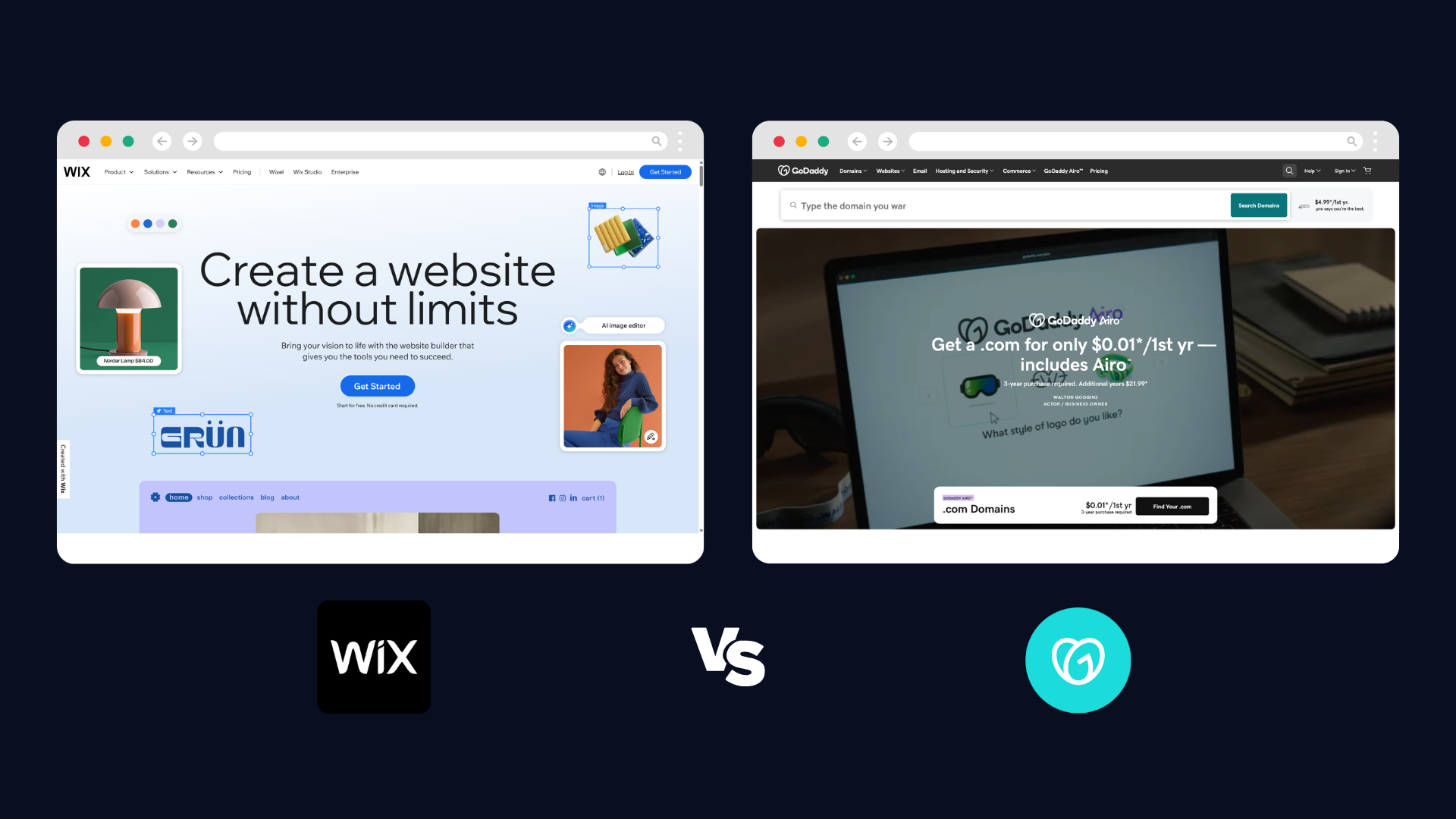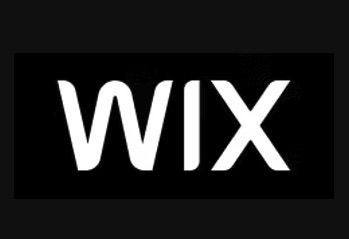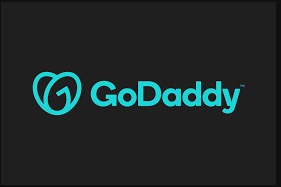Wix vs GoDaddy: Which website builder is better for your business?
We put these two top website builders head-to-head

You want a website that looks great, works well, and helps your business grow. Wix and GoDaddy are two of the industry's heaviest hitters, providing two of the best website builder platforms on the market, well-known for helping beginners create a professionally-designed online presence.
Wix is famous for giving users loads of control with hundreds of templates and powerful design tools. The GoDaddy website builder, on the other hand, speeds up the process by keeping things extremely simple.
So, to help you decide which of the two is a better bet for your business, we’ll compare their key features, ease of use, templates, and overall design flexibility. Plus, we’ll check the pricing and customer support, both of which are major priorities for newcomers. Without further ado, let's get straight into it.

Wix lets you build anything from business sites to blogs without needing to code. You get a flexible drag-and-drop editor and over 900 templates, making it easy to customize every detail. Its advanced features also give you plenty of room to grow.
Pros
- Powerful design controls
- 2,000+ templates
- Advanced AI site builder
- Rich app marketplace
- Excellent SEO tools
Cons
- Can feel overwhelming
- Pricier premium plans
- No switching themes mid-design
- App Market purchases cost extra
- Email not included as standard

GoDaddy helps you get online fast with a straightforward website builder and simple editing tools. You can pick a template, tweak a few sections, and launch — not much hassle. It’s ideal if you want something basic and fast, with always-available support.
Pros
- Fastest setup process
- Lower starting cost
- 24/7 expert support
- No coding needed
- Easy for total beginners
Cons
- Fewer templates
- Limited design flexibility
- Basic SEO options
- No app marketplace
- Fewer ecommerce tools
Wix vs GoDaddy: A detailed breakdown
Feature | Wix | GoDaddy |
|---|---|---|
Starting price | $17/month | $9.99/month |
Free plan | Yes | Trial only |
Templates | 900+ designer-made | 100+ templates |
Editor type | Drag-and-drop, highly flexible | Drag-and-drop, basic |
AI Builder | Advanced AI website builder | Basic AI site generator |
Apps/Plugins | 800+ plug-ins | No app store |
SEO features | Advanced SEO tools | Basic SEO tools |
Ecommerce | Advanced tools, product variants, abandoned cart | Basic, product listing and payments |
Marketing tools | Email marketing, CRM, social media | Basic email marketing, limited CRM |
Ease of use | Flexible, more control | Simpler, fast setup |
Customer support | Help center, tutorials, community forum | 24/7 expert support |
Wix vs GoDaddy: Features
Wix packs a ton under the hood. You get a true drag-and-drop editor, over 900 modern templates, plus advanced design features like custom fonts, video backgrounds, entrance animations, and image cropping. Their AI-powered site builder (Wix AI) can whip up a website in minutes based on your answers. Wix also has a bustling app marketplace: adding booking systems, marketing tools, and new payment gateways is easy. Ecommerce goes deep, with abandoned cart recovery, product variants, Afterpay support, and built-in digital creation tools like Adobe Express.
GoDaddy keeps things simple. You’ll find a handful of template categories, basic design controls, and a streamlined drag-and-drop interface. Adding blogs, eCommerce, or appointment booking is just a click away. GoDaddy excels at providing essentials like mobile-friendly templates, an easy-to-use dashboard, and integrated marketing and social media tools. Their features might not go as deep, but everything you need for a starter website is right there, clearly labeled and fuss-free.
Bottom line: Wix wins for business owners wanting creative flexibility and advanced tools. GoDaddy is best if you want to launch quickly, don’t need fancy extras, and prefer less complexity.
Wix vs GoDaddy: Ease of use
Wix aims to be beginner-friendly. You can start with a template or let their AI build your site. The true drag-and-drop editor means you can move elements wherever you want, tweak colors, fonts, and layouts—all with zero coding. But the sheer number of options can overwhelm, especially if you’re new to building websites. There’s a learning curve if you want to unlock Wix’s deepest features, though most people can build something decent in a short window.
Sign up to the TechRadar Pro newsletter to get all the top news, opinion, features and guidance your business needs to succeed!
GoDaddy goes for minimalism. Open the builder, pick a template, swap photos and text, publish. Done. Their editor steers you, so there’s less room to “break” something or get lost. You won’t spend time hunting for features or menus. If you just want a simple website up fast, GoDaddy is hard to beat. However, power users may find its limits frustrating as customization options and advanced settings just aren’t there.
We see Wix as the better play for those wanting more control and are willing to spend time learning. GoDaddy’s ease of use makes it perfect for total beginners, busy owners, or anyone needing a website yesterday.
Wix vs GoDaddy: Support
Wix offers support via live chat, phone callback, and a rich help center full of guides and tutorials. Premium users get faster responses and dedicated help for urgent issues. Most questions, like billing, editing, or site errors, can be resolved quickly by chatting with their human reps or scanning their extensive help articles. There’s also a supportive community forum, making solutions easy to find any time of day.
GoDaddy delivers battle-tested support: 24/7 help via phone, chat, and SMS in most countries. Their “GoDaddy Guides” are always on call, known for friendly, fast answers on setup or troubleshooting issues. They even help with basic marketing, selling, or hosting questions. If live chat isn’t available, phone support picks up the slack—no waiting days for help.
We rate GoDaddy as the best bet for users who want instant, 24/7 access to real people. Wix shines for those who prefer browsing self-help resources or need advanced troubleshooting for premium plans.
Wix vs GoDaddy: Pricing and plans
Wix offers a free plan so you can build and test without spending a dime. Paid plans unlock custom domains, more storage, advanced analytics, and premium features. Prices start at $17/month for the Light plan and climb to $159/month for Business Elite. Each step up gives access to bigger storage, more collaborators, and stronger marketing tools. Ecommerce features kick in at the $29/month Core plan, with advanced business features reserved for the highest tier.
GoDaddy’s starter plan is cheaper at $9.99/month, with core features included — templates, hosting, SSL, and email. Upgrades add eCommerce, email marketing, and extra integrations. On the downside, GoDaddy’s renewal rates can jump sharply, so that cheap intro price may not last. You’ll also see upsells on added features, domains, or SSL certificates beyond the basics. There’s a 30-day money-back guarantee for annual plans and shorter refund windows for monthly deals.
If budget is your number one worry, GoDaddy grabs the win for affordable starting prices and less commitment. But for growing businesses or power users, Wix is often worth the investment thanks to advanced features and a persistent free option.
Wix vs GoDaddy: Alternatives
If you want something similar to Wix (but not Wix) your best bet is its strong competitor Squarespace. It offers an equally easy-to-use interface, advanced customization choices, breathtakingly beautiful templates, but no app store nor add-ons.
If Squarespace doesn’t tickle your fancy, you should check Weebly. It’s simpler than Wix but offers a free plan, built-in SEO tools, and excellent ecommerce features. Another cheap and convenient alternative to Wix is Webnode – it uses a simple interface and extremely easy-to-use editor, but falls short when it comes to customization.
GoDaddy is loved by many, but not by all. So, if you fall into the latter category, don’t fail to check out Site123. It's a cheerfully cheap and straightforward site builder that unfortunately suffers from a severe lack of customization choices — you can’t even pick out your template.
Jimdo is another swift and simple alternative to GoDaddy and one that targets self-employed business people. If you plan to build a portfolio, startup site, or small online store, Jimdo might be a good choice. And if you wish to start a soon-to-be booming e-commerce business, Shopify should be your top choice for a site builder since it’s also an end-to-end ecommerce platform.
Wix vs GoDaddy: Final verdict
All things considered, there’s no denying that Wix comes off as a stronger candidate. It’s simpler to use than GoDaddy, offers superior design flexibility, and provides a well-supplied app market.
However, if you don’t care much about customization, GoDaddy’s most pocket-friendly plan won’t force annoying ads on your site and will supply you with all you need to swiftly put a site together.
So, if you want more creative control, Wix is the way to go. But if you want a blend of easiness and efficiency, GoDaddy is an excellent choice.
Wix vs GoDaddy: FAQs
Is Wix easier to use than GoDaddy?
Both builders are made for beginners, but GoDaddy keeps things simpler than Wix. You can create a site in minutes by following its step-by-step process. Wix gives you more design options, which can take longer to learn, but also unlocks greater flexibility once you get comfortable.
Which platform is better for ecommerce?
Wix wins for serious online stores. You get advanced ecommerce features like abandoned cart recovery, product variants, and strong tools for growth. GoDaddy supports basic product sales, but its options for customization and marketing aren’t as robust as Wix’s. If your goal is to build an online store, you can also consider dedicated ecommerce platforms like Shopify and BigCommerce.
Can I switch from GoDaddy to Wix, or vice versa?
Yes, you can move your website, but it’s not instant. You'll need to recreate your site on the new platform since direct transfers aren’t supported. Domain names are portable, but custom designs and content will require manual effort to rebuild.
Does either Wix or GoDaddy offer a free plan?
Wix gives you a generous free plan to test everything, but it limits you to a subdomain and shows ads. GoDaddy has a free trial which works for testing purposes, but no forever-free plan for launching production-ready websites.
Which builder offers better support?
GoDaddy’s support is fast and available 24/7. You can reach a real person by phone, chat, or SMS any time. Wix gives you self-help guides, live chat, and fast premium care if you pay for higher tiers. So, if you want instant phone support, GoDaddy wins. But, Wix’s help center is great for self-starters looking for complex answers and guides.
- If you’re building a website, picking the best web hosting provider should also be on your to-do list
Mirza Bahic is a freelance tech journalist and blogger from Sarajevo, Bosnia and Herzegovina. For the past four years, Mirza has been ghostwriting for a number of tech start-ups from various industries, including cloud, retail and B2B technology.
- Ritoban MukherjeeContributing Writer - Software
You must confirm your public display name before commenting
Please logout and then login again, you will then be prompted to enter your display name.